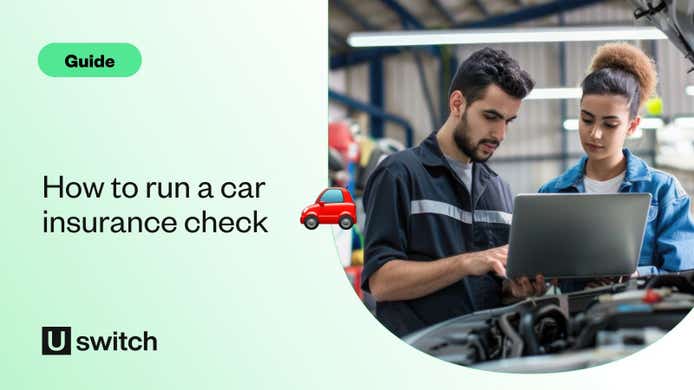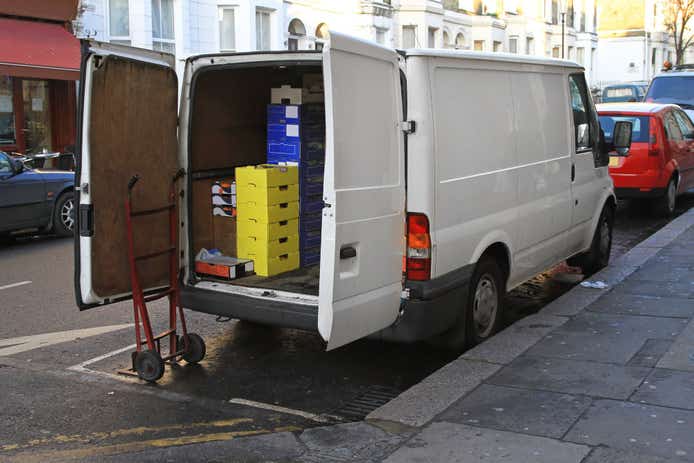In partnership with

How to compare van insurance
Enter your details
Get personalised van insurance quotes by providing your details.
Compare quotes
Find the van insurance that’s right for you by exploring our best deals.
Apply and save
Start saving money and apply with your chosen provider.
What is van insurance?
If you have a van or commercial vehicle that is in use on public roads, you’ll need to take out van insurance. Third-party insurance is a legal requirement to protect other road users.
What level of van insurance cover do I need?
There are three levels of van insurance cover:
- Third-party only (TPO) van insurance will cover you for the cost of damage to third-party property and for any third-party injuries you cause in an accident. It will not cover any damage to your own van or property.
- Third party, fire and theft (TPFT) cover will also pay out if your van is stolen, vandalised or catches fire.
- Comprehensive insurance will repair or replace your van even if the damage is your fault.
What information do I need to compare van insurance?
You will need:
Your van registration number and details, including model, year of purchase, usage and any security devices that have been fitted
Your driving history, including details of any claims or convictions
Your estimated annual mileage, including an estimated split if your van will be used for personal and business miles
Your policy requirements
If insuring a van as part of your employment or business, you will need details of the business type and the cargo being carried. If you don't provide accurate and truthful information, your van insurance provider may refuse or reduce any claim you make on your policy.
How to get a van insurance quote
Decide what you want to insure your van for
To decide your level of cover, you will first need to decide if you want to insure your van for:
- Leisure only (called social domestic and pleasure)
- Work (called business, or commercial, use)
- A mixture of business and leisure use
Choose level of cover
Just like car insurance, van insurance cover comes in three different levels:
Third party only
Third party fire and theft
Add any extras
Some van insurance policies will come with extras or you can add them for an additional fee. These can include:
- Windscreen cover
- Breakdown cover
- Replacement van cover
- Legal expenses
How much does van insurance cost?
Like car insurance, there is no set price for a van insurance policy. The cost of cover will depend on the type of van, its value, your driving history and how the van will be used.
However, you should bear in mind that many vans will be used much more frequently and cover much more mileage than the average family car and can also carry more high-value equipment. This may mean that your van insurance costs more than insurance for a small run-around car. There are specialist van insurers that provide tailored cover for a reasonable price.
The best van insurance will be the van insurance policy that is best for your needs. It will depend on what level of cover you need and what you use your van for.

Would van insurance suit me?
Can I drive a campervan on my car insurance?
Check the registration document. Vehicles in category M1 are classed as cars, while those in categories N1 and N2 are vans.
Do you use your van for work?
This would cover you to transport goods, tools, or work equipment that belongs to you, your business partner, or your employer. It's also known as commercial use or carriage of own goods.
Do you use your van for personal use?
Also known as private van insurance, this is suitable for visiting family and friends, shopping or transporting kit for a hobby. It does not cover work or business related travel such as commuting.
Do you drive to lots of different places?
This would be necessary if you use your van to drive to a single place for work, as well as for social use. If you're travelling to a bus or train station as part of your commute, this also comes under social and commuting.
How can I get cheaper van insurance?
Shop around - use comparison tools to compare quotes. Only insure what you need – additional extras you don’t need will increase the cost of cover.
Have a no-claims discount - providers offer a no-claims bonus based on the number of years you’ve been driving without making a claim.
Pay a larger voluntary excess - the larger you pay upfront then the cheaper your premiums are but premiums, but check you can afford the total amount.
Fit safety features - an alarm, locks and immobilisers fitted to your van can reduce your premium but check with your insurer first.
Pay upfront – paying in monthly instalments means you end up paying interest on your insurance. You could save money if you can afford to pay a lump sum annually.

How do I compare van insurance for business?
There are different levels of van insurance for business.
The most popular is standard business van insurance, which covers you for:
- Commuting to work
- Driving between different locations for work
- Driving to see clients or customers
- Travelling to the bank for work purposes
- Driving other employees or business contacts
- Attending company events
What are the different business van insurance groups?
Business van insurance comes in four levels:
Class 1: provides cover for driving between a number of different places of work or to visit clients and customers. You won’t be covered for door-to-door sales. This is typically the cheapest class of cover.
Class 2: provides the same cover as class 1 van insurance but also allows you to add a named driver – most policies specify this must be a colleague. Again, door-to-door sales are not usually covered.
Class 3: provides cover for long-distance driving, which makes it the most suitable option if you make door-to-door sales. However, you will only be covered to deliver samples, so if you are delivering commercial merchandise, you will need commercial van insurance.
Class 4 or commercial van insurance: you must tell your insurer the type of goods you will be carrying and for what type of business. You will only be insured for carrying the goods you have named for the purpose you have stated – you cannot do a second job, help out a mate, transport items, or for a purpose, you have not declared to your insurer.
Guides
FAQs
How do I know what is covered on my van insurance policy?
Your insurer will send you a policy document, either online or by post. This provides full details of the cover you've paid for. if you want to cancel your van insurance policy - you have a cooling-off period of 14 days.
Make sure you keep all your van insurance documentation safe, in case you need to make a claim at a later date.
What is the difference between a car and a van?
The difference between a car and a van may seem clear, but it's not always as simple as you’d think. Sometimes larger family vehicles such as multiple passenger vehicles – MPVs – may be classified as vans.
If you have a camper van or MPV, you may be unable to get a car insurance quote because your vehicle may actually be classed as a van or another type of commercial vehicle.
If you're unsure you can consult your V5C logbook. Vehicles in category M1 are classed as cars, while those in categories N1 and N2 are vans.
Can I buy fleet cover van insurance?
If you work for a company that uses a number of vans in its fleet, you may need to find a fleet policy. These can include pickup insurance, fleet van insurance, courier van insurance, multi van insurance, any driver van insurance.
As with multi-car insurance you can also get multi-van insurance, this allows you to:
- Insure several vans under one policy
- Have a single renewal date
- Save on having to take out multiple van insurance policies
Does van insurance affect my no claims discount?
Just like on a standard car insurance policy you can build a no claims discount for every year you hold a van insurance policy without making a claim.
Can I buy classic van insurance?
If you own a classic van, one that is at least 20 years old. There are specialist van insurance brokers although you may be able to get an online van insurance quote from mainstream insurance companies.
Car Insurance comparison is powered by Confused.com which is a trading name of Inspop.com Limited who are authorised and regulated by the Financial Conduct Authority. Registered office; Greyfriars House, Greyfriars Road, Cardiff, CF10 3AL, registered in England and Wales 03857130. Please note, we cannot be held responsible for the content of external websites and by using the links stated to access these separate websites you will be subject to the terms of use applying to those sites. By using this system you are also agreeing to our Terms and Conditions and Privacy Policy. Uswitch is an intermediary and receives a percentage of the commission if you decide to buy through us. If you already hold an account with Confused.com, the information held for you will be available to help you complete your quote more quickly - you should check the information is still accurate and up-to-date.
Firm reference no.310635




